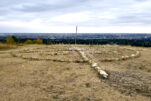Mansoor’s Musings: Quran-burning incident sparks vital lessons
By Mansoor Ladha on August 3, 2023.
For most people, religion is an emotional, personal and sensitive issue. Whether you are a Christian, Muslim, Jew or atheist, one must have the courtesy to respect all religions and beliefs. The recent Quran-burning incident in Sweden, or for that matter any desecration of the Quran, is abhorrent. In the latest incident in Sweden, a Christian Iraqi, now an atheist, tramped on and kicked Islam’s holy book outside the Iraqi Embassy in Stockholm, while Swedish police, who authorized it, watched and kept counter-demonstrators at a safe distance. I shudder to think what would have happened if a Muslim had burned the Bible! Many Muslim countries have called on the Swedish government to stop protesters from burning the Quran. As expected, thousands of people in several Muslim majority countries such as Iraq, Lebanon and Iran, expressed outrage at the Quran-burning incident. In Baghdad, demonstrators occupied the Swedish Embassy and set a small fire and protestors took to the streets in Beirut and Tehran. Iraq expelled the Swedish Ambassador and recalled the Iraqi charge d’affairs from Sweden while other Muslim-majority countries condemned the desecration of the Quran and summoned Swedish diplomats to express their outrage. Although the United Nations Human Rights Council approved a resolution on religious hatred and bigotry, the motion was opposed by the United States, U.K., France, Germany and the European Union – all of whom maintained that it conflicted with their positions on human rights and freedom of expression. According to Universal Declaration of Human Rights, Article 1, “Everyone has the right to freedom of thought, conscience and religion; this right includes freedom to change his religion or belief, and freedom, either alone or in community with others and in public or private, to manifest his religion or belief in teaching, practice, worship and observance.” It is unfortunate that the hostility toward Muslims displaying deep-rooted prejudices, with widespread perception of Islam being associated with terrorism and extremism exists. Such stereotyped view has resulted in discrimination at schools and workplaces, and violent attacks on mosques and individuals, especially women who wear headscarves. When a Muslim engages in violence, it is often assumed that this is because their religion advocates violence. The root of racialism is the lack of contact between the races. Most people have no contact with Muslims at a personal level. The solution is to invite Muslim neighbours for coffee and get to know them. Office colleagues should do the same. It’s only through friendship and personal contacts that one would know Muslims are the same as anyone else. Muslims are hated because of the terrorist attacks undertaken by the so-called jihadists who have no legitimacy or right to unleash a reign of terror in the name of Islam. They do not represent the religion, nor do they have any right to speak for Muslims. They are a bunch of hooligans out to cause death and destruction, under the guise of religion. As the Aga Khan, spiritual leader of Shia Ismaili Muslims, said during the opening of the Aga Khan Museum in Toronto, the Muslim world, with its history and culture, is still unknown to the West. “Even today, the study of the Muslim world in our high schools and universities is a specialist subject. Very little of the Muslim world features in the study of humanities in the West, where courses are essentially centered around Judeo-Christian civilizations. “This lack of knowledge is a dramatic reality which manifests itself in a particularly serious way in western democracies since public opinion has difficulties judging national and international policy vis-Ã -vis the Muslim world. The two worlds, Muslim, and non-Muslim, eastern and western, must as a matter of urgency make a real effort to get to know one another, for I fear that what we have is not a clash of civilizations, but a clash of ignorance on both sides. Insofar as civilizations manifest and express themselves through their art, museums have an essential role to play in teaching the two worlds to understand, respect and appreciate each other,” he said. “Tolerance, openness and understanding toward other peoples’ cultures, social structures, values, and faiths are now essential to the very survival of an interdependent world. Pluralism is no longer simply an asset or a prerequisite for progress and development, it is vital to our existence,” he said. Ignorance breeds suspicions and intolerance toward others. A pluralist, cosmopolitan society is one, which not only accepts differences but also actively seeks to understand them and learn from them. Diversity is not a burden to be endured, but an opportunity to be welcomed. Political, educational and civic leaders should be concerned about the rise in hate crimes in Canada. The best way to eradicate this venom is to initiate a campaign of intermingling of different races in neighbourhoods and communities. At formal and informal levels, efforts should be made to allow different races to mingle as neighbours, friends and colleagues. Religious leaders should hold more inter-faith functions to educate their congregations about different religions. School boards and trustees have a responsibility to devise curriculums containing different religions and cultures so the country’s citizens-to-be are well conversant with the make-up of Canadian society. While we continue trumpeting our country as the most diverse and multicultural, our students go through the education system without ever hearing about the plurality of our society, cultures, religions, faiths and traditions. I loved the Canadian TV show “Little Mosque on the Prairie” shot in a fictitious town called Mercy, which depicts a classic example of religious brotherhood when a Christian church offers space to Muslims in the town to hold their services. What a superb gesture of religious cooperation, camaraderie and non-denominational brotherhood. “Little Mosque on the Prairie” may be a fictional sitcom but its message – two major religions working for everyone’s betterment in harmony – has universal application to present-day Canada. Let’s not tarnish Canada’s glittering image, which is the envy of the world, as a multiracial nation, portraying diversity and multiculturalism. Mansoor Ladha is a Calgary-based journalist and author of Memoirs of a Muhindi: Fleeing East Africa for the West, Off the Cuff and A Portrait in Pluralism: Aga Khan’s Shia Ismaili Muslims 21-20




